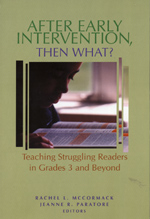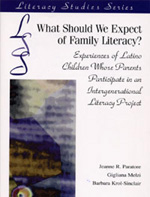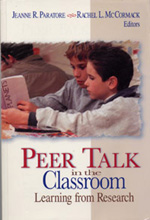
|
After Early Intervention, Then What? Teaching Struggling Readers in Grades 3 and Beyond | Opening Doors, Opening Opportunities: Family Literacy in an Urban Community | ||||||||||||||||||
 |
 |
|||||||||||||||||||
|
Copyright 2003, International Reading Association After Early Intervention, Then What? shows that even though there are multiple pathways to success for struggling readers, these pathways are unified by long-held principles about effective teaching -- instruction is intense, explicit, strategic, and supported by knowledgeable teachers; curriculum is challenging and interesting; and student engagement and expectations for learning are high. |
Copyright 2001, Allyn & Bacon How can families work together with schools to boost children's reading and writing ability? This book discusses, in clear and concrete terms, how to engage parents in successful literacy programs. The book concludes with a first-hand account of the Intergenerational Literacy Project, a program in which Dr. Paratore has worked for a number of years. |
|||||||||||||||||||
| What Should We Expect of Family Literacy? Experiences of Latino Children Whose Parents Participate in an Intergenerational Literacy Project | Peer Talk in the Classroom: Learning from Research | |||||||||||||||||||
 |
 |
|||||||||||||||||||
| Copyright 1999, International Reading Association | Copyright 1997, International Reading Association | |||||||||||||||||||
|
What Should We Expect of Family Literacy? is a detailed account of the effects of parental involvement in a literacy project on Latino children's academic performance. Literacy researchers, particularly those interested in family literacy and English as a second language learning, will find this book to be a valuable resource, as will teachers of diverse classes and supervisors of family literacy programs. |
Teachers often initiate and control classroom activity. However, research suggests that teachers would like to relinquish some of this control to students, and many have accomplished this difficult task with notable success. Peer Talk in the Classroom is a collection of these successes. This book is unique because it describes the research underlying the instructional practice and explains how the practice was planned, implemented, and evaluated in a classroom setting. | |||||||||||||||||||
| Copyright 2004, Dr. Jeanne R. Paratore |